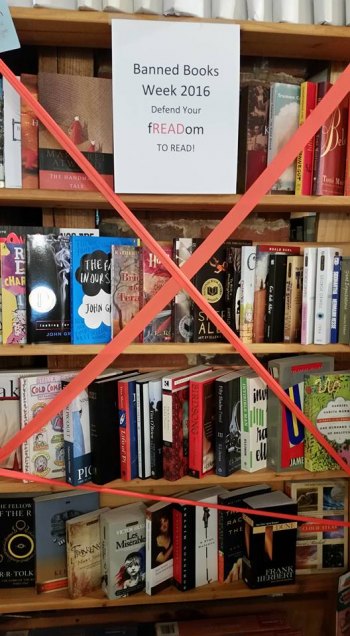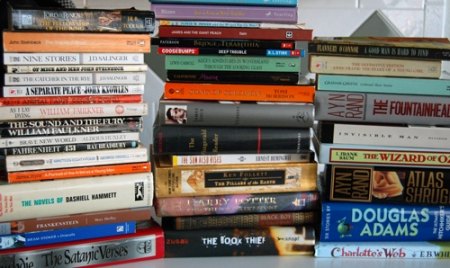Defend Your Freedom to Read
Editor's note: The Current is re-posting this story from 2012 because the fight for freedom is timeless. Jocelyn has moved away from Ocracoke, but we appreciate her contributions to the Current while she lived here.
by Jocelyn Wright

It’s Banned Book Week! If you didn’t know this don’t worry, I had never heard of Banned Book Week until it was recent topic on the podcast ‘Stuff You Should Know.’ I was surprised to learn that several books have been challenged almost every year since their publication. Novels such as To Kill A Mockingbird by Harper Lee (1960), Catcher in the Rye by J.D. Salinger (1951), The Great Gatsby by F. Scott Fitzgerald (1925) and Lord of the Fliesby William Golding (1954) are all in the top 9 on the American Library Association’s (ALA) list of the 100 most frequently challenged classics. But what does it mean to challenge a book and how does it become banned? It’s a process that begins locally and sometimes ends in the U.S. Supreme Court.
Any book can be challenged, and possibly banned, by filing a written challenge (or Reconsideration Form) with your local library or the ALA. Challenges are an attempt to remove or restrict materials, based upon the objections of a person or group,and banning is the removal of those materials. A challenge can be filed online at the ALA website or you can take the book to the librarian and say, “I challenge this book based on [fill in the blank].” Challenges are often taken up to protect children from “inappropriate” “sexual content” or “offensive” language.
Most libraries are members of the ALA and operate under the Library Bill of Rights. Article 3 states, “Libraries should challenge censorship in the fulfillment of their responsibility to provide information and enlightenment.” Also included in the Bill of Rights is the Free Access to Libraries for Minors which states, “Librarians and governing bodies should maintain that parents – and only parents – have the right and the responsibility to restrict the access of their children – and only their children – to library resources.”
But each library responds to challenges in their own way. In the BHM Regional Library system (Beaufort, Hyde and Martin counties) a committee of 5 people will read the material in question, review the book and respond in writing to the individual or group that filed the challenge. Susan Benning, the Director of BHM Libraries, has been working in libraries for 16 years and has participated in the reconsideration committee. No books have been pulled under her watch. It is because of the commitment of librarians, teachers, parents, students and other concerned citizens that most challenges are unsuccessful and the material is retained in the school curriculum or library collections.
If challenges reach the court level the material is often kept in the library thanks to the First Amendment of the United States Constitution. I enjoyed this response by the Michigan Court of Appeals regarding the Kurt Vonnegut novel Slaughterhouse-Five.
Todd v. Rochester Community Schools, 200 N.W.2d 90 (Mich. Ct. App. 1972): In deciding that Slaughterhouse-Five could not be banned from the libraries and classrooms of the Michigan schools, the Court of Appeals of Michigan declared: "Vonnegut's literary dwellings on war, religion, death, Christ, God, government, politics, and any other subject should be as welcome in the public schools of this state as those of Machiavelli, Chaucer, Shakespeare, Melville, Lenin, Joseph McCarthy, or Walt Disney. The students of Michigan are free to make of Slaughterhouse-Five what they will."
Since “Winter Is Coming” and we’ll (hopefully) get a chance to relax and catch up on some reading, forget the New York Times Bestseller List and Amazon reviews. Read a book on the ALA’s list of challenged books and celebrate your freedom to make of it what you will.

A short list of challenges that can be found on the ALA website:
- Harry Potter series were the most challenged books from 2000 – 2009 for characterizing authority figures as “stupid” and portrayed “good witches and good magic.”
- Judy Blume, notable children’s author, is on the most challenged list four times for Deenie (masturbation), Blubber (bullying), Forever (teen sex) and Are You There God, It’s Me Margaret (menstruation).
- Fallen Angels by Walter Dean Myers is repeatedly challenged because the novel, which is about the Vietnam War, contains violence and profanity.
- And Tango Makes Three by Peter Parnell and Justin Richardson is a children’s book that tells the true story of two male penguins adopting an egg and raising a chick. It has been challenged for homosexuality, religious viewpoint and unsuited to age group.
- The Hunger Games trilogy by Suzanne Collins is challenged for being anti-ethic, anti-family, having offensive language and occult/satantic themes
Jocelyn Wright is an Ocracoke resident, and the lead National Park Service biotechnician for the island.



